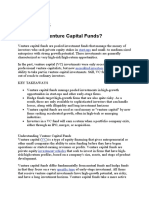Funding sources
Delivering and implementing
RESOURCE
�INTRODUCTION
What Why How
There are a number of funding options In order to implement the most effective Once you have a better understanding of
available to you as you look to launch your funding strategy for your business it is the options available try to further your
business. A range of factors will influence important to have an appreciation of knowledge by speaking to the people and
the most suitable funding source for you the options. It is also essential that you organisations behind each of the options
and this resource offers an overview of select the one that is most suitable to to understand their expectations and
those options. your requirements and you avoid the how they operate. It would also be a good
temptation of a scatter gun approach to idea to talk to other businesses that have
funding applications. chosen specific funding routes and try and
learn from their experiences.
01
�FUNDING OPTIONS
Loans Venture
funding
Grant Angel
funding investment
Funding
Options
Crowd Venture
funding philanthropy
02
� 1. Venture funding
Venture funding provides investment in return for a stake in your company. In other types of funding, where finance is provided as
a loan, there is a legal and contractual right for the lender to receive interest. However, in the case of venture funding, the investors’
returns are entirely dependent on the growth and profitability of your venture. Consequently, venture capital funders have an
interest in increasing the value of the business for its owners as well as themselves. A venture capital provider will often appoint
a non-executive director to the board of your venture as a condition of funding. Although this may appear to reduce your control
over your venture, these non-executives are often very experienced individuals who can provide valuable guidance and challenge
to the business.
Private equity firms and ‘Business Angels’ can provide venture funding, as can government-backed funds that invest in particular
sectors, geographies or types of venture. Private equity firms are generally only interested in larger investments, often in excess
of several millions. If your venture is looking for smaller levels of investment, you might consider one of the government-backed
schemes such as the Enterprise Capital Fund or Early Growth Fund. Business Link advisers will be able to suggest the type of
venture funds most suitable for your requirements.
2. Angel investment
Business angels are private individuals who provide smaller amounts of funding, often at earlier stages of innovation than private
equity firms will consider. Business angels vary considerably in terms of their areas of interest and appetite for risk, and are often
more hands-on than other forms of equity investors. The British Business Angels Association can provide introductions to a
network of potential funders, although they may charge a fee for this service.
03
� 3. Venture philanthropy
Venture philanthropy applies the principles of venture capital investment to the community sector. Venture philanthropists develop
funds by pooling government grants and charitable giving from individuals or organisations and then invest in a portfolio of
community sector ventures. Funding may take the form of loans or grants. Alternatively, venture philanthropists may share in the
surpluses generated by social enterprises, using these to reinvest in other initiatives. Venture philanthropists provide long-term
investment and often high levels of engagement in the form of hands-on support and capacity building.
Just as with traditional venture capital investment, if you are seeking venture philanthropy funding, you will be expected to show
rigorous evidence for the success of your innovation and will be held accountable for managing performance and results.
4. Crowdfunding
Crowdfunding utilises social networking websites and social media to connect large numbers of potential investors with ventures
looking for funding. Ventures can come from the commercial or community sector. This approach is generally more suitable if
you need to attract small amounts of one-off funding, although there are examples of crowdfunded investments of hundreds of
thousands of pounds. In the community sector, crowdfunding is attractive to individuals who want to see a direct relationship
between what they give and the difference it makes. Often, information and updates on progress is a sufficient return for their
investment. In the commercial sector, you will need to be flexible in terms of how you reward your investors. Generally, ventures
offer a return that varies according to the level of investment given. For example, you might offer certificates, credits on your
website, or samples of your product or service.
To secure this type of funding, you need to post an engaging description of your venture on a crowdfunding website for a fixed
period of time. You will need to include an outline of how much money you are looking to raise and how you will use the funds.
Generally you must reach your target level of funding within the timescale given or all offers are withdrawn. The platform which
hosts the crowdfunding market place will charge a percentage of the funding you raise as a fee. For examples of crowdfunding
websites, look at Kickstarter, which launched initially in the USA or Bloom, a relatively new UK-based platform.
04
� 5. Grant funding
Grants are an important source of funding for ventures in the public, community and charitable sectors. They are a form of
financial assistance given by government, independent foundations, philanthropists and private sector companies where there is
no expectation or requirement that you repay the money. Understandably, this can be a very attractive form of funding for many
ventures, but you should consider that all grant funders have their own criteria and application processes can be very lengthy.
When thinking about applying for grants to fund your venture, consider whether your mission and vision is aligned with that of the
funding organisation. Would you have to adapt your innovation in order to make it attractive to the funder and are you prepared to
do so? What will be the reporting requirements? Can you support the additional administration this might require?
Reliance on grant funding can also have risks. For example, when governments change, grant-funding priorities can change alter
overnight. This can have major implications for organisations that depend on this form of funding for their long-term sustainability.
If you are seeking funding from a grant, you need first to ensure that:
• your aims and those of the funding organisation are aligned
• the conditions associated with the grant are not too restrictive and you can adhere to them
• the period of grant funding is sufficiently long term for your needs
• the timing of the application and award process is aligned with your plans for launching your venture.
The sheer volume of grant sources can be overwhelming and there are a number of organisations that act as brokers between
grant providers and ventures seeking funding. Most significant grant-giving organisations, such as the Esme Fairbairn Foundation
and the National Lottery, provide detailed guidance on projects they will fund and their application process. Look at this
information carefully to find out whether their grants are suitable for your venture.
05
� 6. Loans
Loans are perhaps the most straightforward form of finance and have the advantage of ensuring that you retain full ownership
of your venture. However, unlike venture funding, you are legally bound to pay back a loan. This could mean that any assets you
provide as security, such as your home, may have to be sold to repay the loan if your venture fails.
Loans are available from individuals, clearing banks, specialist lenders and government schemes. They are more suitable if you
require smaller levels of funding, you are confident that your venture will generate sufficient income to meet repayments, and if
your venture has sufficient security (perhaps in the form of premises, equipment or guaranteed contracts) to support the loan.
This can be more difficult in the start-up stages of a venture where you may not be able to provide security and where the venture
doesn’t have a sufficient track record of healthy financial performance.
The current climate in the financial sector has led to many start-ups and small to medium sized enterprises reporting difficulties in
raising loans. In response, government has launched new schemes to make credit available. Two examples are given below:
• The Enterprise Finance Guarantee provides guarantees for loans from £1000 to £1million, repayable over terms of up to 10
years for organisations with a turnover of £25million or less. Government guarantees 75% of the loan to reduce the risk to
lenders and encourage banks to extend credit to support growth. This scheme does not make it any easier for high-risk ventures
to obtain loans but may be suitable if your venture is relatively low risk and you would expect to be able to raise a loan in normal
circumstances.
• The Early Growth Fund is run by the Small Business Service and offers loans of up to £100k for innovative, knowledge intensive
start-ups and early stage ventures. This form of funding is only likely to be attractive to you if you are able to match it with
additional private sector investment.
A wide range of funding options is available to you, each with different implications for the ownership of your venture, the
direction and focus of your activities and the returns you will need to generate. There are also many sources of detailed advice. You
should consider funding options at the earliest possible stage and seek independent expert advice to ensure that the investment
strategy you adopt meets the needs of your venture into the medium and long term.
06











































































































